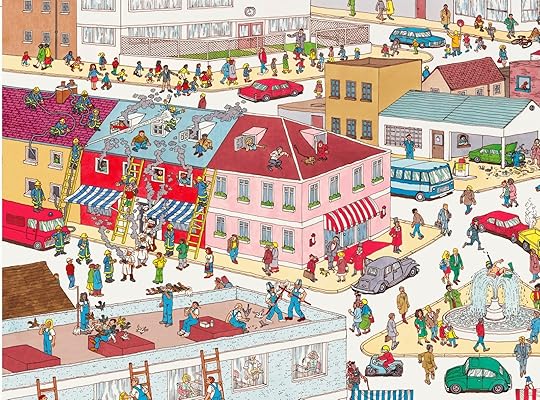Not All Those Who Sonder are Lost
Sonder n. The realization that each random passerby is living a life as vivid and complex as your own—populated with their own ambitions, friends, routines, worries and inherited craziness—an epic story that continues invisibly around you like an anthill sprawling deep underground, with elaborate passageways to thousands of other lives that you’ll never know existed, in which you might appear only once, as an extra sipping coffee in the background, as a blur of traffic passing on the highway, as a lighted window at dusk.
The above definition comes from the site: The Dictionary of Obscure Sorrows, and I think it might be my newest favorite site. Sonder is a realization, an epiphany that comes when you see that the guy who sells you coffee every morning has a picture of his family, or when that homeless man on the corner tells you that he graduated from Yale and served as an Army Ranger. We tend to break the people in our lives (especially those on our peripheral) down to base stereotypes, unchanging and small boxes that allow us to view them in one light and then forget that they existed the moment they are gone. Sonder comes when those people surprise us and break out of the roles we assigned for them. Before that, they were just background characters, extras in the movie that is your life, your story.
It is interesting how stories give us the language to talk about this phenomenon. We are the main characters in our lives. Our story is about us, we see antagonists and challenges and plot twists wherever we look. We all see a cast of supporting characters, (our friends and family.) We understand that they are complex, but maybe not as complex of characters as we are. Then there are the extras, little more than set dressing to the happenings of our lives, but to them, we're the dressing. We become that guy standing on the subway, wearing the black jacket, or that girl walking down the street in uncomfortable shoes. More to the point that is all we will ever be in their stories, one-dimensional creatures. A few pixels in the background of a picture they took once. A voiceless body on the streets at night. All our problems, our thoughts, our wishes, our hopes, and fears, and loves, are nothing to them. Even celebrities are just faces on a screen. Yes, we may know their names and facts about their lives, but they still aren't the heroes of our stories.
Where's Waldo is a perfect microcosm of sonder. The whole name implies that we need to find this one person, this special person. "Can you see Waldo?" He is hidden amongst a multitude of people and crowds, but we ignore all those people. All we want to do is find this one man in a weirdly striped shirt. We look for the needle in the haystack while ignoring the hay, but have you ever stopped to look at the other people occupying Waldo's world? They are alive, they have their own problems and triumphs. There are firemen putting out a fire that was obviously started by three incompetent chefs. There is a car accident, a man in scuba gear in the fountain, kids crossing the street, a janitor being attacked by birds, people LARPing for their own amusement on a rooftop, etc. All those people have lives, and maybe even animated spouses and children and pet parakeets waiting for them at home.
In fact, of all the people on a page, I would argue Waldo is one of the more boring ones. Sure he is seeing the world, but is he living in it? Whenever we see him he's alone, never engaged with another person or doing something wacky or something fun. He just stands there. So, yes, he is the main character of this book, but is that always the best thing? For my money I would rather be part of the couple who is standing in front of the building on fire. They are shoulder to shoulder watching the calamity unfurl as a chef tries to explain himself to a fireman, but they are together and there is something sweet about it, something that Waldo will never get to experience.
Ever since I was a kid sitting in the back seat watching the passing cars I have wondered about the people in them. Where were they going? What did they do? Were they happy? Sad? Today I do it on a larger scale with co-workers and friends and the guy walking his dog on the street. Maybe that is just part of being a writer, a storyteller. I try to find the story in everyone I meet.
A state of sonder does not mean to imply that we are not unique, just not as unique as we sometimes think. You are not a diamond among the rough, just a diamond among many others. When you stop thinking of yourself as something different you get to see how truly alike we all are. There will never be another you, but there will also never be another person like your mailman or that taxi driver that ran those two red lights or your baby niece in her crib. When you understand sonder, you understand how precious the world is, and how truly lucky we are to spend a few years passing through it.

The above definition comes from the site: The Dictionary of Obscure Sorrows, and I think it might be my newest favorite site. Sonder is a realization, an epiphany that comes when you see that the guy who sells you coffee every morning has a picture of his family, or when that homeless man on the corner tells you that he graduated from Yale and served as an Army Ranger. We tend to break the people in our lives (especially those on our peripheral) down to base stereotypes, unchanging and small boxes that allow us to view them in one light and then forget that they existed the moment they are gone. Sonder comes when those people surprise us and break out of the roles we assigned for them. Before that, they were just background characters, extras in the movie that is your life, your story.
It is interesting how stories give us the language to talk about this phenomenon. We are the main characters in our lives. Our story is about us, we see antagonists and challenges and plot twists wherever we look. We all see a cast of supporting characters, (our friends and family.) We understand that they are complex, but maybe not as complex of characters as we are. Then there are the extras, little more than set dressing to the happenings of our lives, but to them, we're the dressing. We become that guy standing on the subway, wearing the black jacket, or that girl walking down the street in uncomfortable shoes. More to the point that is all we will ever be in their stories, one-dimensional creatures. A few pixels in the background of a picture they took once. A voiceless body on the streets at night. All our problems, our thoughts, our wishes, our hopes, and fears, and loves, are nothing to them. Even celebrities are just faces on a screen. Yes, we may know their names and facts about their lives, but they still aren't the heroes of our stories.
Where's Waldo is a perfect microcosm of sonder. The whole name implies that we need to find this one person, this special person. "Can you see Waldo?" He is hidden amongst a multitude of people and crowds, but we ignore all those people. All we want to do is find this one man in a weirdly striped shirt. We look for the needle in the haystack while ignoring the hay, but have you ever stopped to look at the other people occupying Waldo's world? They are alive, they have their own problems and triumphs. There are firemen putting out a fire that was obviously started by three incompetent chefs. There is a car accident, a man in scuba gear in the fountain, kids crossing the street, a janitor being attacked by birds, people LARPing for their own amusement on a rooftop, etc. All those people have lives, and maybe even animated spouses and children and pet parakeets waiting for them at home.
In fact, of all the people on a page, I would argue Waldo is one of the more boring ones. Sure he is seeing the world, but is he living in it? Whenever we see him he's alone, never engaged with another person or doing something wacky or something fun. He just stands there. So, yes, he is the main character of this book, but is that always the best thing? For my money I would rather be part of the couple who is standing in front of the building on fire. They are shoulder to shoulder watching the calamity unfurl as a chef tries to explain himself to a fireman, but they are together and there is something sweet about it, something that Waldo will never get to experience.
Ever since I was a kid sitting in the back seat watching the passing cars I have wondered about the people in them. Where were they going? What did they do? Were they happy? Sad? Today I do it on a larger scale with co-workers and friends and the guy walking his dog on the street. Maybe that is just part of being a writer, a storyteller. I try to find the story in everyone I meet.
A state of sonder does not mean to imply that we are not unique, just not as unique as we sometimes think. You are not a diamond among the rough, just a diamond among many others. When you stop thinking of yourself as something different you get to see how truly alike we all are. There will never be another you, but there will also never be another person like your mailman or that taxi driver that ran those two red lights or your baby niece in her crib. When you understand sonder, you understand how precious the world is, and how truly lucky we are to spend a few years passing through it.

No comments have been added yet.



